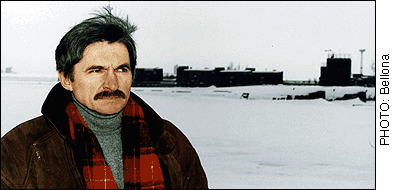
Russian Supreme Court Leaves Enviro Whisteblower In Limbo
Monitor Wire Services
 |
Monitor Wire Services |
|
|
 The
Russian Supreme Court refused on Thursday to dismiss the case against Alexander Nikitin, a former Soviet submarine Captain charged with treason for passing information on military nuclear waste disposal to a Norwegian environmental group.
The
Russian Supreme Court refused on Thursday to dismiss the case against Alexander Nikitin, a former Soviet submarine Captain charged with treason for passing information on military nuclear waste disposal to a Norwegian environmental group.
The court returned the case to the Federal Security Services (FSB) -- the successor to the Soviet KGB -- for further investigation. Amnesty International is convinced that another round of investigation into this case will yield nothing new, but leaves Nikitin at risk of imprisonment and possible harassment by FSB agents. The group said this appears to be a sign of the power that the FSB has over the judiciary. In its press release, Amnesty International said, "Given the lack of substantial evidence and the overwhelming doubt that the FSB can find new evidence, this decision by the highest judicial body in the country is extremely worrying. The court is keeping Alexander Nikitin in an endless legal limbo, where a case could go back and forth for additional investigation indefinitely." Nikitin was stoic in the grim Moscow courtroom. "I expected this result," he said, his voice choked with emotion. "The problem is that the continued investigation could last forever. I have to think through how I can maintain my mental stamina."
|
|
Nikitin
was arrested in February 1996 by the FSB for helping the Norwegian environmental organization, Bellona, write a report on the nuclear hazards within the Russian Northern Fleet. The nuclear waste storage practices described in the report have been called "a Chernobyl in slow motion."
Because of the report, Nikitin was accused of espionage and divulging of state secrets. If found guilty he risks up to 20 years in prison. After spending nine months in jail, he was released but ordered not to leave the city of St. Petersburg. His advocates say there is no valid legal foundation for the charges against Nikitin, as they are entirely based on secret and retroactive legislation issued by the Russian Ministry of Defense. Enviros fear that no other groups will dare bring up controversial nuclear safety questions if Nikitin is convicted by use of secret decrees. The Bellona report is still declared illegal literature in Russia. The prosecution of Nikitin has raised considerable international attention. Shortly after his arrest he was adopted by Amnesty International as the first prisoner of conscience since Andrei Sakharov. VP Al Gore and Secretary of State Madeleine Albright have protested the case to Russian officials. Considerable support has come through the Internet. Bellona provides web pages that following the case at: http://www.bellona.no/e/russia/nikitin/.
|
|
The court scene
on Thursday was dramatic and chaotic as two members of the Russian Duma -- the ruling body akin to the U.S. Senate -- were thrown out of the courtroom.
The members were escorted out of the courtroom just as Nitkin's head lawyer, Yuri Schmidt, complained that the hearing was being held behind closed doors, forcing about 100 journalists and other observers to wait for the outcome in another courthouse room or in the hallway. Schmidt argued that it was illegal to exclude Duma members, and after ten tense minutes, the Court agreed. But as soon as court resumed with the Duma members watching, Schmidt demanded that the head of the Supreme Court step down. The Supreme Court judges withdrew for several minutes, then returned with the Court Chairman still sitting on the bench. Later, Nitikin said, "My lawyers explained this declaration with a clear impression that the Judge was biased and personally had an interest in one specific outcome of the case." Gery Reznik, the co-defender of Nikitin remarked, "As long as Russia, probably as the only country in the world, has the opportunity to send cases back for further investigation, the judges will do this to avoid having to make decisions." Nikitin was blunt about his feelings of what could be the FSB's never-ending effort to build a case. "I'm sorry to live in an undemocratic state," he said.
Albion Monitor February 8, 1999 (http://www.monitor.net/monitor)
All Rights Reserved.
Contact rights@monitor.net for permission to use in any format.
|